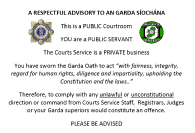When Courts Become Crime Scenes
Citizen’s Arrest of
Noirin O’Sullivan
Courting Justice? Or Wasting Our Time?
Bad Boys, Power & Money, Money, Money
So.. Are Irish Judges above the Law?
Complaint to Gardai about Gardai
Citizens Arrest Gardai in Courthouse
Democracy or Dictatorship Mr Kenny?
Special Detective Unit ‘joins’ Integrity Ireland
Judges.. Please Give Us Justice!
Judgements, Threats & Consequences
“Disgusting” Commissioner Callinan?
Justice delayed is justice denied!
Holding the ‘protected elite’ to account?
Irish Police Chief & DPP subpoenaed









 DONATE & SUPPORT
DONATE & SUPPORT



The Good Stuff: ‘An Garda Siochana’ translates as ‘guardians of the peace’ and we all know decent Gardai who respect the law and do their best to carry out their duties in a fair and unbiased manner. Set up in 1923 to replace the much-resented and divisive Royal Irish Constabulary the current motto of the Gardai is “Working with Communities to Protect and Serve” and each of us has a story to tell where we received personal help or assistance from honest hardworking Gardai, ‘got a break’ when it was perhaps not technically deserved, or received a friendly acknowledgement in passing on the street. It is a fact that the Irish Police are regarded by most citizens as being significantly more approachable on a daily basis than many of their foreign counterparts. Certainly, the average Garda on the beat is rarely seen as a threat to the citizen or a figure to be despised, but is regarded more as a helpful member of the community who has the power and authority - when needed - to step in and take lawful action to protect the law-abiding citizen from crime or danger. All of this makes decent members of An Garda Siochana an invaluable asset in this democratic republic of ours - as long as individual Gardai place their service to the citizen, the law and the Constitution foremost, and resist the ever-present temptation to indulge in cover-ups and protectionism when colleagues do wrong; or, succumb to pressure from peers and superiors to favour the interests of the protected elite - at the expense of ordinary law-abiding citizens.
The Not-So-Good Stuff: Like all authoritarian institutions, lower-ranking members of the Gardai in particular are subject to the pressures of an institution that demands their complete obedience and loyalty. One’s advancement through the ranks and one’s pension is at stake of course if, as a ranking member of the force you incur the disapproval of your superiors. This in itself is not a problem of course, as long as Garda bosses respect the code of ethics and encourage due adherence from their subordinates. It is when things go awry within the force - and especially when things go wrong amongst the higher ranks - that generic ‘obedience and loyalty’ issues become a problem, not an asset. When one factors in the depressing reality that favouritism, nepotism and protectionism are intrinsic features of Irish political life that extend to all but the lowest tiers of society, one begins to understand how decent Gardai can, over time, become compromised. ‘An Garda Siochana’ was described by a senior academic in 2009 as “one of the most secretive police forces in the developed world.” Why would this be, one might ask? Why for example, would senior Gardai refuse to meet law-abiding citizens making enquiries about supposed ‘ongoing Garda investigations’. Why is the internal Garda Code ‘confidential’? Why do Garda Authorities claim selective exemption from the Freedom of Information Act? How and why do they repeatedly fail to respond to Court subpoenas - and why are they allowed to do this? Why are serious complaints of criminal wrongdoing regularly suppressed or ignored? And why the pretence of a Garda Ombudsman who is in fact subject to the unchallenged directions of the Garda Commissioner?
The Really Bad and Depressing Stuff: I-I members (including serving members of the Gardai) have reported internal bullying and intimidation by their Garda bosses - especially if they raise concerns. Citizens too regularly complain of apathy and disinterest, inexcusable failures or refusals by Gardai to investigate serious complaints, or worse still, being lied to about alleged ongoing investigations. When a determined citizen presses for a response, he or she can then be subject to threats, harassment, intimidation, and even serious physical assaults and false arrests. Some of these activities have been carried out by serving Gardai at the behest of ‘connected persons’ in Irish society who had a personal dispute with another citizen, or, who were involved in potentially-damaging legal action. In some cases, Gardai have acted covertly like medieval thugs enforcing the will of their overlords; that is, the illegitimate wishes of certain ‘connected persons’ who are themselves, often engaged in criminal activity. But perhaps worst of all is the inexorable erosion of confidence amongst law-abiding citizens; that even those Gardai who genuinely endeavour to do their best, cannot reverse the endemic cronyism and protectionism that has apparently filtered down from the top, and is effectively preventing An Garda Siochana from being fit for purpose. No great surprise to learn then, that senior Gardai are NOT necessarily promoted ‘on merit’ and that all appointments over the rank of Superintendent are assigned by the Government. So much for the supposed ‘independence' of the police and the separation of powers!
If it were possible to make an accurate calculation of the evils which police regulations occasion, and of those which they prevent, the number of the former would, in all cases, exceed that of the latter.
Karl Wilhelm Von Humboldt (1767–1835), German statesman, philologist.



Garda: Articles of Interest
Guerin Report an embarrassment for the Government
Public enquiry into Garda corruption
Village Magazine - Garda corruption
Suicides due to bullying & intimidation within Garda Siochana
The secretive ‘Garda SDU’ - Ireland’s armed counter-terrorism unit
An Garda Siochana - an analysis of a police force unfit for purpose
Garda Reform - Get on with it!
The Do’s and Don’ts of Prosecuting the Gardai - by Niall Hartnett
Garda Corruption & Treatment of Whistleblowers
